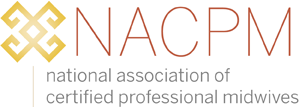This week the National Black Midwives Alliance (NBMA) is holding their first nationwide membership meeting on Thursday, June 2, 2022. The meeting will cover organizational status, an analysis of the work that they’ve done so far, opportunities for current members to join committees, as well an overview of their current goals.
NBMA members can RSVP here : bit.ly/nbmameeting
More information about becoming a NBMA member can be found here.
Since 2012, NACPM has committed to investing in a strong, racially, ethnically and socially representative Certified Professional Midwife (CPM) workforce to meet the urgent needs of childbearing people and to eliminating unconscionable racial disparities in birth outcomes, especially within Black and Indigenous communities.
We understand that this work demands collaboration! As an organization, NACPM supports and centers the work of people of color-led organizations and equity initiatives. NACPM is a proud supporter of NBMA!
Building on our history of success in providing scholarship support to overcome systemic barriers for student midwives of color, NACPM secured a $15,000 grant from Direct Relief International to partner with the National Black Midwives Alliance to support their Black Midwife Mentorship Program, providing student midwives of color with mentors. This partnership will help grow both the number of students served and the stipend paid to mentors. NACPM was also a proud supporter of Black Maternal Health Week 2022.
As our country has become all too aware, the U.S. ranks 50th in mortality for birthing persons in the world, and 37th in the world in infant mortality. Black childbearing people are up to 4 times more likely to die of pregnancy-related complications than their white counterparts, regardless of level of education and income, and their babies are 2.5 times more likely to die in their first year of life. Perinatal mortality is the tip of the iceberg: approximately 50,000 birthing people annually experience life-threatening complications that too often cause lifetimes of physical and emotional suffering and disability, with Black and Indigenous people affected disproportionately.
Although a key cause of these disparities is unequal access to care, NACPM recognizes that societal and institutional racism, a system of power based on color, is the root cause. NACPM is deeply committed to addressing racial oppression within our organization, the profession of midwifery, and the perinatal care system. A recent report on the demographics of the nurse-midwifery profession showed only 6.85% of CNMs are Black and .58% are Indigenous; although we lack specific data, anecdotal evidence indicates a similar workforce composition of CPMs.
Recognizing the impact of limited access for people of color to CPM care and the acute lack of diversity in the midwifery workforce, NACPM is committed to investing in the systemic changes needed to open pathways for more Black midwives to enter the profession, and for opportunities for midwives of color to build and sustain their midwifery practices.
We urge NACPM members to consider supporting NBMA by becoming a member of their organization and attending their upcoming nationwide member meeting.
You can also make a donation to NBMA here.






















